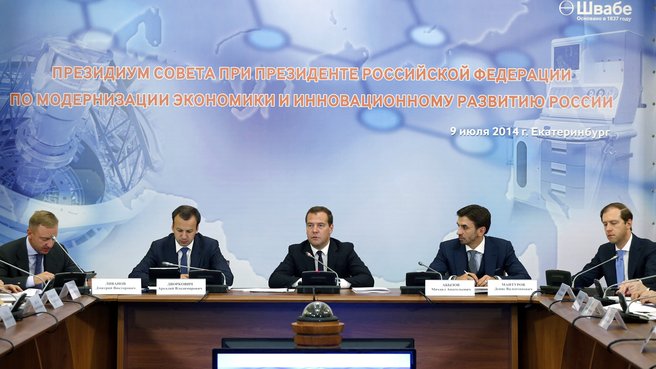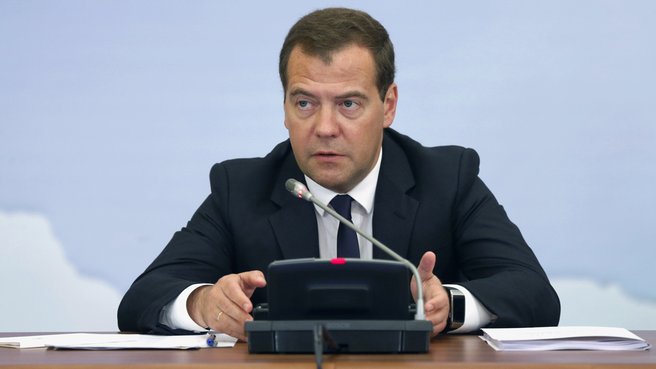Meeting of the Presidium of the Council under the Russian President for Economic Modernisation and Innovative Development.
Dmitry Medvedev’s opening remarks:
We have now broken free from the gravity of Innoprom, which admittedly has become quite powerful. Our industrial trade fair is doing well, we even thought about combining it with some others. Today’s meeting is held with the participation of the Presidium members and invited guests.
Today, we’ll talk about photonics, an innovative topic. This area of research and technology did not appear today, but is nevertheless very promising and is based on the use of light emission.
It is difficult to name an area where photonics could not be used now or in the future. This technology is used for information transmission and processing using fiber-optic communication lines, and to improve the accuracy and quality of industrial processes, such as laser welding or processing of parts. It is widely used in microelectronics, engineering, lighting engineering, modern architecture and even show business. It is no accident that the UN General Assembly proclaimed 2015 the International Year of Light and Light Technology. So, the timing for this meeting is good.
Importantly, there’s growth potential. According to experts, in the near future it can be used to form a number of fundamental, rather than breakthrough, technologies, that will transform the manufacturing industry, medicine and agriculture, as well as a host of other areas.
As you may recall, our country broke new ground in the sphere of quantum electronics and lasers 50 years ago. Our researchers were awarded the Nobel Prize in Physics for it. This was a long time ago, and despite certain difficulties in the subsequent period, Russia still has good scientific potential and rich experience in the field of optics and optoelectronics research. Some of our fellow citizens have created successful businesses in this field abroad. Individual projects are being implemented by defence enterprises, where this technology is also used in a very productive way.
Let’s face it, commercial use of such designs is rare. The share of domestic products on the international markets is negligible. Of course, it’s also a question of counting. According to the Ministry of Industry, Russia accounts for about $300 million out of $400 billion. Clearly, this may be an approximation, but the proportion is probably accurate. Therefore, our goal is to consolidate the efforts of science, higher education, business, and government in order to compete for a better place.
Dmitry Medvedev: "A year ago, the Government approved a roadmap for photonics development. It provides for 34 organisational, legal and informational measures. As a result, we plan to reach civilian production of photonics in the amount of about 50 billion roubles by 2018, and this industry should create about 60,000 high-tech jobs."
As you may be aware, we are funding research and design, educational programmes, cooperation projects between universities and high-tech industrial enterprises. In some regions, specialised support infrastructure is being created, including technology platforms, territorial clusters and engineering centres. Our development institutions are also working in this area, so I won’t dwell on who did what, since the information is there for everyone to see.
A year ago, the Government approved a roadmap for photonics development. It provides for 34 organisational, legal and informational measures. As a result, we plan to reach civilian production of photonics in the amount of about 50 billion roubles by 2018, and this industry should create about 60,000 high-tech jobs. But if we manage to attain these results (which are quite modest, I believe, for our country), it will still mean that we have made a qualitative breakthrough into this market.
As of the end of today's discussion, the roadmap should be corrected and supplemented. We will be able to prioritise tasks associated with the development of promising areas such as radiophotonics, innovative quantum optical materials and their use in the new-generation electronic devices; focus on cooperation with international research centres; and create conditions for transferring advanced technology. However, we certainly shouldn’t harbor any illusions, because no one is eager to share the latest developments. This is understandable. It’s about money, so it’s imperative that we encourage import substitution wherever possible, since this is our strategic priority.
In conjunction with their colleagues, the Ministry of Industry and Trade should include all this in the Photonics sub-programme. It is imperative that the efforts of all development institutions are consolidated, in order to bring together all stages of the innovation cycle, from research to production. In addition, we should consider photonics when updating the priority areas of research, technology and engineering, as well as the list of critical Russian technologies.
Dmitry Medvedev: "It is imperative that the efforts of all development institutions are consolidated, in order to bring together all stages of the innovation cycle, from research to production. In addition, we should consider photonics when updating the priority areas of research, technology and engineering, as well as the list of critical Russian technologies."
Stimulating demand for high-tech products is important. The departments that engage in regulating construction and industrial safety will need to include in their regulatory requirements the use of photonics in the construction and reconstruction of complex objects, including infrastructure. Standards in healthcare and agriculture should also include such technical possibilities.
I would also like to draw your attention to the fact that about 70% of the organisations that produce laser, optical and optoelectronic products are small businesses (although we are meeting today at a large enterprise). Given the fact that these are small businesses, and that this market is global in nature, the challenge, of course, is to simplify access to loans and to support these businesses as they try to gain a foothold on external markets, and not only in Russia. This could be done through the programmes implemented by Vnesheconombank.
In general, I would like to discuss once again what can be done to improve state regulation in this sphere. I now give the floor to the Minister of Industry and Trade, Mr Manturov.
<…>













